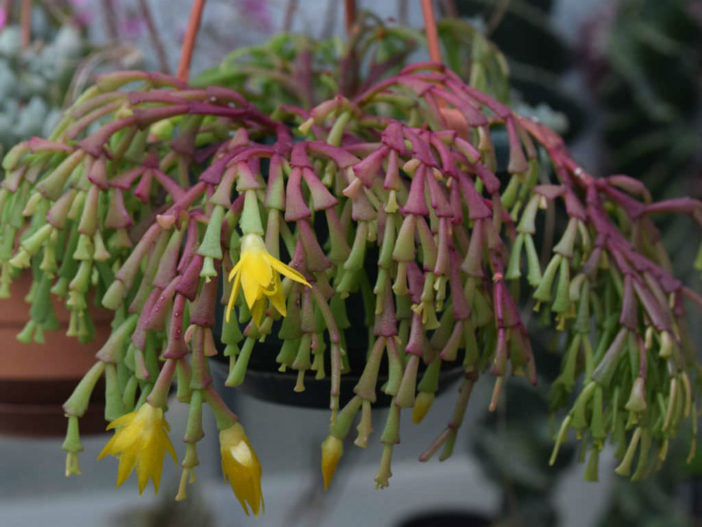Scientific Name
Hatiora epiphylloides subsp. bradei (Porto & Castell.) Barthlott & N.P.Taylor
Synonym(s)
Hariota epiphylloides f. bradei, Hariota epiphylloides var. bradei, Hatiora epiphylloides subsp. bradei, Hatiora epiphylloides f. bradei, Pseudozygocactus bradei, Pseudozygocactus epiphylloides subsp. bradei, Pseudozygocactus epiphylloides var. bradei, Rhipsalis epiphylloides var. bradei, Schlumbergera lutea subsp. bradei
Scientific Classification
Family: Cactaceae
Subfamily: Cactoideae
Tribe: Rhipsalideae
Genus: Hatiora
Description
Hatiora epiphylloides subsp. bradei, also known as Schlumbergera lutea subsp. bradei, is a shrubby cactus with pendent, shortly segmented branches. It tends to have narrower, more elongated stem segments than Hatiora epiphylloides subsp. epiphylloides, which have fewer lateral areoles and somewhat larger flowers.
The solitary flowers are brilliant yellow, funnel-shaped, and appear at the end of the branches in spring.
Origin
Hatiora epiphylloides subsp. bradei is native to Brazil. It grows as an epiphyte in the Atlantic forests from eastern Sao Paulo to southwestern Rio de Janeiro at elevations above 3,280 feet (1,000 m).

Hardiness
USDA hardiness zones 10a to 11b: from 30 °F (−1.1 °C) to 50 °F (+10 °C).
How to Grow and Care
Hatiora grows in the wild in tropical rain forests of South-Eastern Brazil, as far south as the state of Parana, along the border with Paraguay. Although they grow mostly on tree trunks, they are sometimes found growing on rocky ground. In the wild, Hatiora bloom in spring and will sometimes flower twice in one year.
These cacti thrive best in indirect light with exposure to morning and evening sun. They prefer well-drained soil. Cactus or epiphytic compost works well. Hatiora can be propagated easily through cuttings that can root immediately in soil. It likes long nights of about 14 hours. Cover the plant with a paper bag to shut out sunlight. Try not to reposition the plant once flower buds appear, as these could fall off during any movement. It needs a month's rest after flowering, so water sparingly during this period.
Learn more at How to Grow and Care for Hatiora.
Links
- Back to genus Hatiora
- Succupedia: Browse succulents by Scientific Name, Common Name, Genus, Family, USDA Hardiness Zone, Origin, or cacti by Genus
Photo Gallery
Click on a photo to see a larger version.



